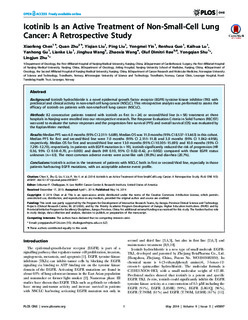Icotinib is an active treatment of non-small-cell lung cancer: A retrospective study
Chen, X; Zhu, Q; Liu, Y; Liu, P; Yin, Y; Guo, R; Lu, K; Gu, Y; Liu, L; Wang, J; Wang, Z; Røe, Oluf Dimitri; Shu, Y; Zhu, L
Abstract
Background
Icotinib hydrochloride is a novel epidermal growth factor receptor (EGFR) tyrosine kinase inhibitor (TKI) with preclinical and clinical activity in non-small cell lung cancer (NSCLC). This retrospective analysis was performed to assess the efficacy of icotinib on patients with non-small-cell lung cancer (NSCLC).
Methods
82 consecutive patients treated with icotinib as first (n = 24) or second/third line (n = 58) treatment at three hospitals in Nanjing were enrolled into our retrospective research. The Response Evaluation Criteria in Solid Tumors (RECIST) was used to evaluate the tumor responses and the progression-free survival (PFS) and overall survival (OS) was evaluated by the Kaplan-Meier method.
Results
Median PFS was 4.0 months (95% CI 2.311–5.689). Median OS was 11.0 months (95% CI 8.537–13.463) in this cohort. Median PFS for first and second/third line were 7.0 months (95% CI 2.151–11.8) and 3.0 months (95% CI 1.042–4.958), respectively. Median OS for first and second/third line were 13.0 months (95% CI 10.305–15.695) and 10.0 months (95% CI 7.295–12.70), respectively. In patients with EGFR mutation (n = 19), icotinib significantly reduced the risk of progression (HR 0.36, 95% CI 0.18–0.70, p = 0.003) and death (HR 0.10, 95% CI 0.02–0.42, p = 0.002) compared with those EGFR status unknown (n = 63). The most common adverse events were acne-like rash (39.0%) and diarrhea (20.7%).
Conclusions
Icotinib is active in the treatment of patients with NSCLC both in first or second/third line, especially in those patients harbouring EGFR mutations, with an acceptable adverse event profile.
